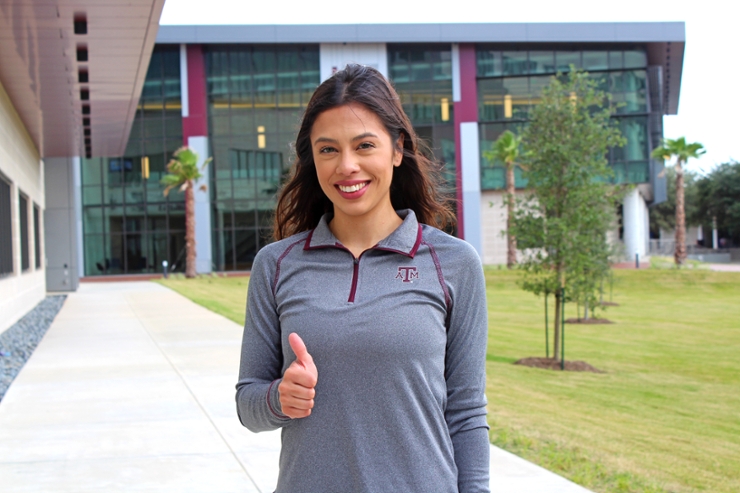First Generation Scholar Made a Home at A&M-Galveston
November 8, 2019
Tweet
By Andréa Bolt
Since 2014, Texas A&M University at Galveston has graduated nearly 1200 known first generation scholars and Natalie Lerma was one of them.
Despite a heavy course load, scholarship requirements and extensive volunteering responsibilities; Lerma was always smiling. While she was an A&M-Galveston student, her cause for happiness was deep and she said it likely stemmed in large part from gratitude from being a first-generation scholar.
“Sometimes it is hard to relate to other students. The things you struggle with, they can’t understand,” she explained. “It’s not just school. You have your family, your finances. You have to be able to balance it all but also need to excel in school. I get up at 4:30 a.m. to get here from Houston and when I get home I see my family for a moment before I go to bed exhausted.”
Lerma’s gratitude at her opportunity was energizing for her. She felt that the trial of managing several critical priorities while being the best student she could helped give her an intangible edge. “I’m a great multitasker!"
There’s a sense of purpose that comes through when she described the responsibility of being a role model for her younger cousins. “Hopefully by the time they’re getting ready to go to school, they’ll have a good example to follow,” she says. Her family is certainly proud of her, but Lerma did plenty for herself.
Always keen on mathematics, she was drawn to the prospect of engineering. Given A&M -Galveston’s marine focus, Lerma’s major was Offshore and Coastal Systems Engineering, but she’s a naturally inquisitive person. Anytime a class sounded interesting to her, she tried to take it. This led her to pursue two minors, one in mathematics and the other in maritime administration.
A full course load, however, wasn't enough for someone making the most of her opportunity. Lerma also served as a member of the Undergraduate Research Scholars program (UGRS), where she worked on advanced research projects directly with professors. Her particular project had her working closely with Dr. Ayil Anis, an associate professor in the Department of Marine Sciences.
Lerma assisted Anis in the organization and analyzation of various data collected concerning oceanic surface temperatures. The project is looking specifically at heat fluxes at the sea surface. The goal is to be able to formulate several mathematical equations that can be used to account for fluctuations in oceanic surface temperatures.
Lerma was passionate about all the opportunities that being at a school like A&M-Galveston presented her and she made the most of it.
She absolutely wasn't solely concerned about her own success, though. When seeking a job on campus, Lerma could have chosen between a higher-paying Student Instructor (SI) position or working at the newly-established F1RST Program.
“The F1RST Program was established at TAMUG in 2017 and Natalie was a peer mentor during the first year of the program and was a valuable partner in getting it off the ground,” said Associate Director of Siebel Learning Center Lisa Stewart.
The F1RST Program serves first generation students by providing them a four-year scholarship and a comprehensive support community. Participants are all housed together as a Living Learning Community in their first year and are together in a weekly Learning Community course throughout their time at A&M-Galveston.
Currently there are 59 students in the F1RST Program and the first student will be graduating from the program next month, a full year-and-a-half early.
For Lerma, the choice to be a part of the program was easy. She was tasked with guiding first generation students in their transition into university life and helped them navigate a myriad of priorities.
“You see a lot of confused students who maybe don’t know what opportunities the school has. Their parents are working all the time to make this dream a reality, so they can’t help in the adjustment,” said Lerma. “Working for the F1RST Program is something with a lot of intrinsic value.”
With everything on her plate, it would be understandable if Lerma was simply proud of being the first in her family to graduate from college, but she always wanted more.
Impact and ripple effects mean a lot to Lerma. “I’m what some people would call a ‘green engineer,’” said Lerma. “I have a moral disposition that means I can’t work in an industry that I don’t believe in.”
With classes and professors that really engaged her, Lerma was inspired to pursue graduate school. Due to this interest and her success in school thus far, Lerma was made a Louis Stokes Alliance for Minority Participation (LSAMP) scholar. LSAMP, which is funded by the National Science Foundation (NSF), is geared toward giving minority students with a determination to get into graduate school a generous financial boost, provided the student meets certain research and academic requirements.
Given her track record so far, Lerma will have options about where she will attend graduate school. “I love this school so much,” she said. “There are things here people take for granted. It’s incredible that I can go see a professor in their office without waiting in line. Their doors are open and they’re here to help.”
Lerma described almost a home away from home. “There’s a community here. People make time for each other, and you actually get to know them. It’s special.”
*The original publication of this article indicated Natalie Lerma had not graduated. The story has been updated to reflect her correct status as a graduate of the class of 2019.
###
Media contact:Marketing and Communications
a_bolt@tamug.edu
409.740.4929
More:
Read more about Maritime Administration
Read more about Student Life